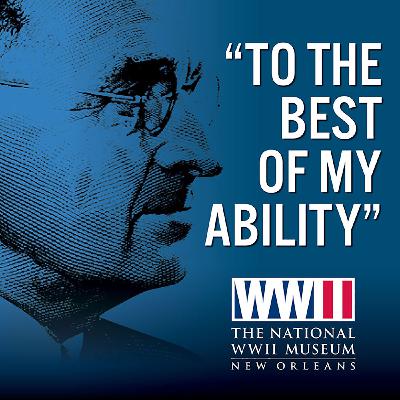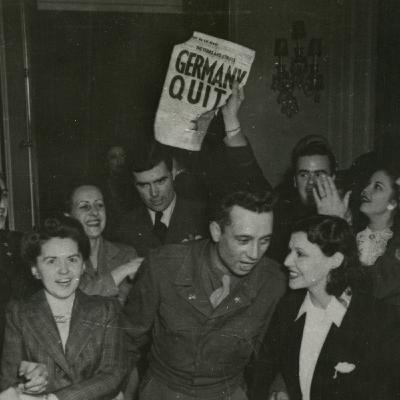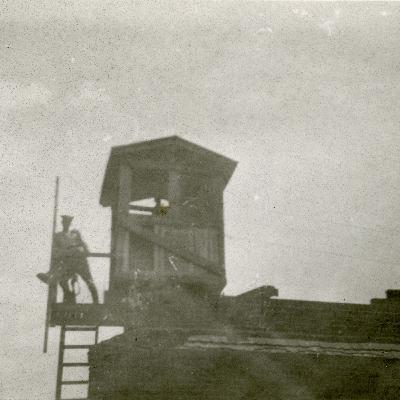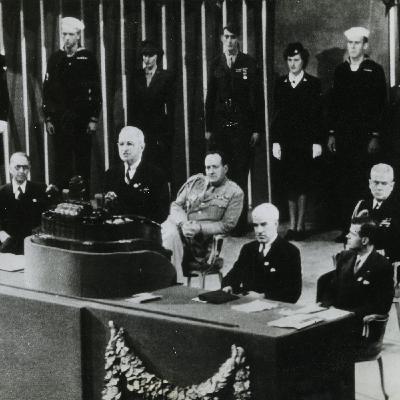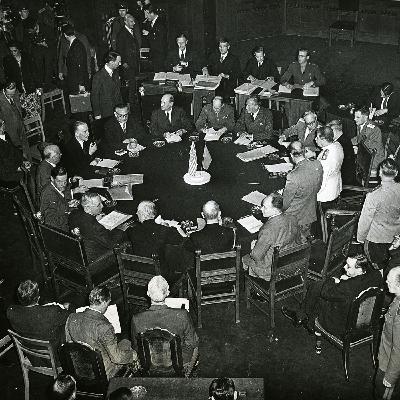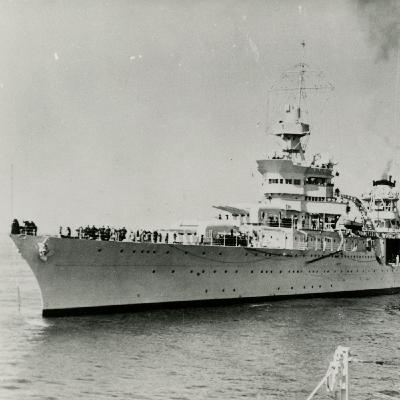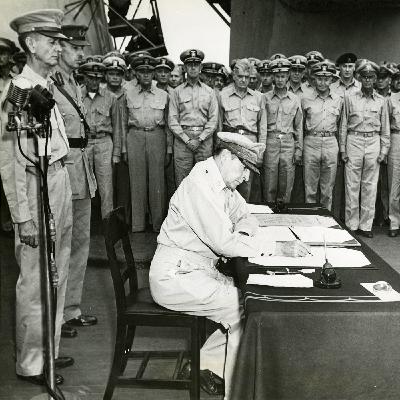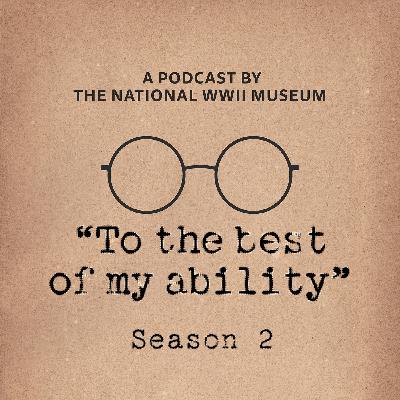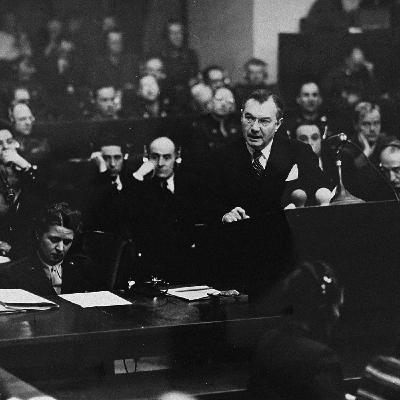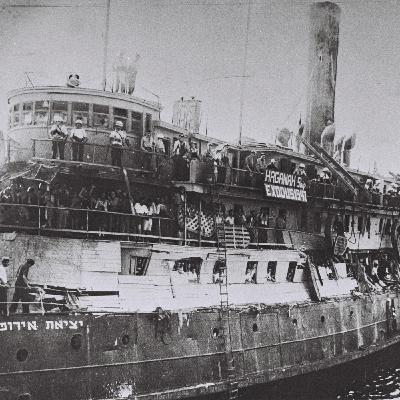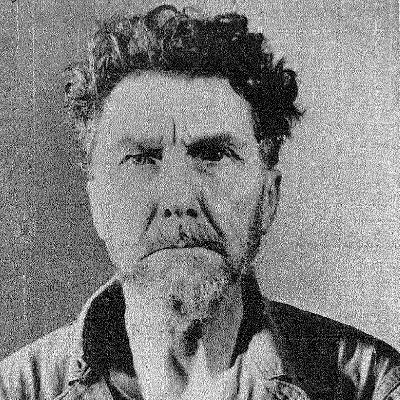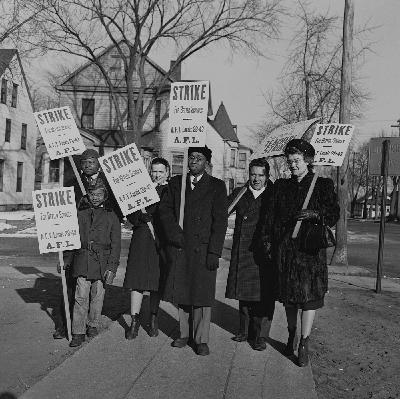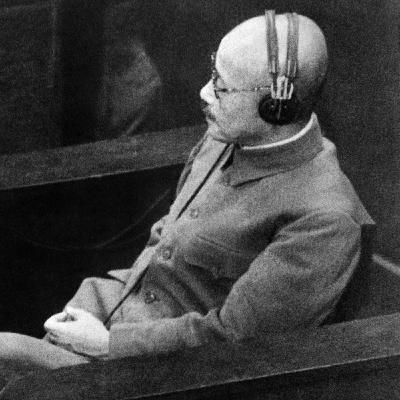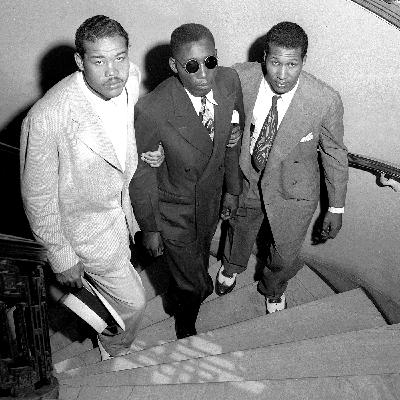Discover "To the Best of My Ability"
"To the Best of My Ability"

"To the Best of My Ability"
Author: The National WWII Museum
Subscribed: 65Played: 930Subscribe
Share
© 232215
Description
Season 3
As the international situation deteriorates, FDR faces multiple challenges: readying the country for war across two oceans, facing down the threats from Nazi Germany and Imperial Japan, and attempting to rally political support at home. Americans are not convinced of the foreign threat. Many are still isolationists, seeking to let the world solve its own problems while America stands aloof. Public opinion seems to be changing, but it's a gradual process.
Will FDR be able to master these multiple crises? Will the American people rally behind him? Will the nation prepare in time to face one of the gravest threats in its history—or will all of FDR's efforts be too late? Join The National WWII Museum for Season 3 of this limited series podcast as we explore America's road to Pearl Harbor as seen through the eyes of President Franklin D. Roosevelt.
As the international situation deteriorates, FDR faces multiple challenges: readying the country for war across two oceans, facing down the threats from Nazi Germany and Imperial Japan, and attempting to rally political support at home. Americans are not convinced of the foreign threat. Many are still isolationists, seeking to let the world solve its own problems while America stands aloof. Public opinion seems to be changing, but it's a gradual process.
Will FDR be able to master these multiple crises? Will the American people rally behind him? Will the nation prepare in time to face one of the gravest threats in its history—or will all of FDR's efforts be too late? Join The National WWII Museum for Season 3 of this limited series podcast as we explore America's road to Pearl Harbor as seen through the eyes of President Franklin D. Roosevelt.
23 Episodes
Reverse
April 1945: In a war that changed the world, a month that changed the course of the war.
Click HERE to follow the new podcast by The National WWII Museum: Making Masters of the Air. Masters of the Air is an Apple Original series from executive producers of Band of Brothers and The Pacific, streaming January 26 on Apple TV+. The series follows the men of the 100th Bomb Group (the “Bloody Hundredth”) as they conduct perilous bombing raids over Nazi Germany and grapple with the frigid conditions, lack of oxygen and sheer terror of combat conducted at 25,000 feet in the air. Masters of the Air is based on the best-selling book by Donald Miller, and features a stellar cast led by Academy Award nominee Austin Butler, Callum Turner, Anthony Boyle, Nate Mann, Rafferty Law, Academy Award nominee Barry Keoghan, Josiah Cross, Branden Cook and Ncuti Gatwa. The Making Masters of the Air podcast by The National WWII Museum is co-hosted by Playtone’s Kirk Saduski and Donald Miller, author of the book, Masters of the Air. Listen to the premiere episode featuring an interview with Executive Producer Tom Hanks on Friday, January 26. Masters of the Air is an Apple Original series from executive producers of Band of Brothers and The Pacific. Streaming on January 26 on Apple TV+
Truman’s first few weeks in office were some of the most tumultuous in Presidential history. As Nazis forces experience blow after blow from Allied forces, fascism in Europe begins to crumble. Before the end of April, both Adolf Hitler and Benito Mussolini are dead. After more than five years of total war, a ceasefire takes effect on May 8, 1945. ”This is a solemn but glorious hour,” Truman declares. “The flags of freedom fly all over Europe."
The war in Europe was over, but fighting raged in the Pacific. “We are only half-through,” Truman declares to the American people. He was right. The Battle of Okinawa (April 1 - June 22) was one of the hardest-fought in the history of the US military. Okinawa is a mass of mountains, jungle, and mud, and the battle generated monstrous casualties on both sides, 93,000 Japanese, 12,000 US, and 140,000 Okinawan civilians. Just days into his presidency, Commander-in-Chief Truman was presiding over a bloodbath.
With the war in Europe over, the Allied powers had to turn to the difficult business of governing Germany and the other occupied territories. It was a huge task: to restart a functioning economy for an entire continent, to restore systems of law and government, to bind up the wounds of war. On June 5, 1945, the US, UK, USSR, and France jointly assumed "supreme authority" over German territory. The Third Reich was now dead, and Germany officially passed under the control of the victorious Allies.
World War II had been so horrible that the victorious powers decided that nothing like it must ever happen again. President Roosevelt’s dream had been to establish a “United Nations” (UN) organization, in which the peace-loving nations of the world would settle disputes and intervene to punish aggression, but it was Truman who saw it through. On June 26, the UN charter was signed in San Francisco. Would it succeed where previous international organizations had failed and keep the world at peace?
In July 1945, representatives of the victorious Allies met in the heart of Germany, in the Berlin suburb of Potsdam. It is a new cohort of leaders, while Stalin was still Soviet dictator, the inexperienced Truman and a brand-new British prime minister, Clement Attlee, represented the Anglo-American alliance. Here, in the squalid ruins of a once-great city, the three men lay their plans for their final battle: the conquest of Japan.
Even with victory in sight, soldiers, sailors, and airmen continued to die in the Pacific theater. The USS Indianapolis, for example, was torpedoed by Japanese submarine I-58 while transporting parts of the atomic bomb “Little Boy” from San Francisco to Tinian in the Mariana Islands. Three hundred men went down with the ship as she sank. For the other nearly 900 sailors in the water, clinging desperately to their life rafts, the ordeal had just begun.
In the hours after Truman drops the bomb on Hiroshima, news reports begin to surface of “a city vanished.” As he said on many occasions, Truman never regretted the decision—seeing the bomb as the quickest way to bring an end to the bloodiest war in history. Speaking to the American people via radio, Truman described the bomb as “harnessing of the basic power of the universe,” and swore that “we shall completely destroy Japan’s power to make war.”
With Japan’s defeat, World War II finally came to an end. The formal end of World War II took place in suitably dramatic fashion, with a surrender ceremony on board the USS Missouri on September 2. “This is the day we have been waiting for since Pearl Harbor,” said President Truman. “This is the day when Fascism finally dies.” Untested and relatively unknown when he became President just over four months ago, Truman had proven himself.
Allied victory had rescued humanity from a dark future, but for President Truman and his administration, the celebrations were short lived. There were still a number of challenges that remained, including the demobilization of millions of men and women, reshaping the economy without putting millions out of work, growing racial tensions at home, and the looming threat of the nation’s burgeoning rivalry with the Soviet Union.
In February 1946, a California Court heard arguments challenging the practice of segregating students of Mexican descent into “remedial schools for Mexicans.” Sylvia Mendez and her family spent the next year of their lives entangled in a court battle. Though they would ultimately prevail and the Court deemed the schools unconstitutional, thus ending legal segregation in California, Sylvia was not permitted to attend the school near her home designated for white children until 1948. This landmark case became an international cause célèbre, and would later be used to justify the “separate is unequal” ruling of 1954’s Brown v. Board of Education.
History’s greatest war was over, but our story has only just begun. The Truman Presidency not only had to deal with the legacy of the recently concluded war, it also had to wrestle with new problems at home and abroad: a dangerous international situation, the spread of Communism and Soviet influence, and the pressing need to form a “more perfect union” at home by ensuring equal rights and justice for all. Would the “man from Missouri” rise to the challenge? Would the United States, and the world, enjoy peace and prosperity, or was World War III in the offing?
On November 20, 1945, an International Military Tribunal of the victorious Allies began a series of war crimes trials in Nuremberg, Germany, designed to bring prominent Nazis to justice. The very men who had perpetrated some of the most horrific crimes in human history, including the Holocaust and the mass murder of POWs and civilians, now had to stand trial for their deeds. Nuremberg was a fitting site: the very city where Adolf Hitler used to stage the Parteitag, massive Nazi rallies attended by 100,000s of his adoring followers. The trials were a significant turning point for modern international law—a recognition that “following orders” was not a sufficient excuse for brutal and inhuman behavior.
Throughout World War II and in the aftermath, persecuted Jews tried to find their way into the British Mandate of Palestine, often deemed illegally by British authorities, as the Royal Navy tried to stop them. On December 14, 1945, the ship Hannah Senesh, carrying 252 refugees, evaded British patrols and beached itself at Nahariya in Palestine. The passengers came ashore via a rope bridge and evaded capture. Large-scale Jewish immigration to Palestine increased regional tensions, which would explode into war in 1948 with the invasion of the newly established State of Israel by its Arab neighbors. Truman was the first US president to be faced with trouble in the Middle East; he would not be the last.
After more than 20 years living abroad as an expatriate in Italy, poet and Nazi sympathizer Ezra Pound was charged with 19 counts of treason against the United States. During World War II, Pound broadcast pro-Facist propaganda into the US, accepting payment from the Italian government. He expressed support for Hitler and Mussolini, criticized FDR, and blamed the Jews for the outbreak of the war—all staples of Nazi propaganda, Pound was eventually found mentally unfit to stand trial, and was incarcerated at St. Elizabeth’s psychiatric facility for more than 12 years. While institutionalized, he managed to befriend white supremacists and members of the Ku Klux Klan, including John Kasper, a staunch segregationist who was suspected of committing multiple synagogue, church, and school bombings.
By January 5, 1946, President Truman had had enough. He was tired of Stalin’s aggressive behavior, tired of the Soviet Union establishing “police states” in countries it occupied. In a letter to his Secretary of State, James, F. Byrnes, he declared that the United States would not recognize these new Communist governments. Enough was enough. “I’m sick of babying the Soviets,” he stated. This blunt statement set off a chain of events known as the Cold War, a development that brought unprecedented American intervention across the globe. As the Iron Curtain descended on eastern Europe, fears over a new global war with the USSR cast a pallor over every aspect of American life. State-side, suspicions turned into targeting Jewish, Black, and gay Americans suspected of being involved in the Communist Party, setting the stage for an unprecedented era of domestic spying.
The strike wave of 1945-1946 was a series of large-scale post-war labor strikes in the United States, spanning numerous industries and public utilities. In the year after V-J Day, more than five million American workers were involved in strikes, including oil workers, the United Auto Workers, and the United Mine Workers. The strikes lasted on average four times longer than those during the war, and even today remain the largest “job actions” strikes in American labor history. Among these events, the Havaco No. 9 Mine disaster resulted in miners going on strike in unprecedented numbers to demand better safety regulations. Separately, meat packers with the AFL-CIO began a massive strike on January 16, 1946. After 10 days, the government seized the plants.
In a January 25, 1946 telegram, General Douglas MacArthur recommended that Hirohito not face a war crimes trial. The International Military Tribunal for the Far East, also known as the Tokyo War Crimes Tribunal, tried 28 Japanese military and political leaders on 55 separate counts encompassing the waging of aggressive war, murder and conventional war crimes committed against POW’s, civilians, and inhabitants of occupied territories. The defendants included former prime ministers, former foreign ministers, and former military commanders. The emperor was not among them: to MacArthur, he was a valuable symbol of Japanese national unity. As long as he agreed to cooperate, he was useful to the American occupation authorities.
On February 12, 1946, Isaac Woodard was returning home to North Carolina from Camp Gordon in Augusta, GA on a Greyhound bus. Woodard, a decorated veteran of the Pacific theater, asked the driver if there was time for him to use the restroom while on a scheduled stop. The driver grudgingly agreed, and the trip continued without incident until they reached Batesburg, SC, where the driver called local authorities and had Woodard arrested. What followed was one of the nation’s most heinous hate crimes, and the attack left Woodard permanently blind. Less than two weeks later in Columbia, TN, a second Black veteran who also served in the Pacitic theater, James Stephenson, was the victim of an attempted lynching after shopkeepers called police on him for allegedly disturbing the peace. It wasn’t until well-known figures like Orson Welles and Langston Hughes began to publicly call out these racist attacks committed by law enforcement that President Truman finally began to address some of the racial injustices and violence being committed across the nation, ultimately culminating in the desegregation of the military in 1948.


